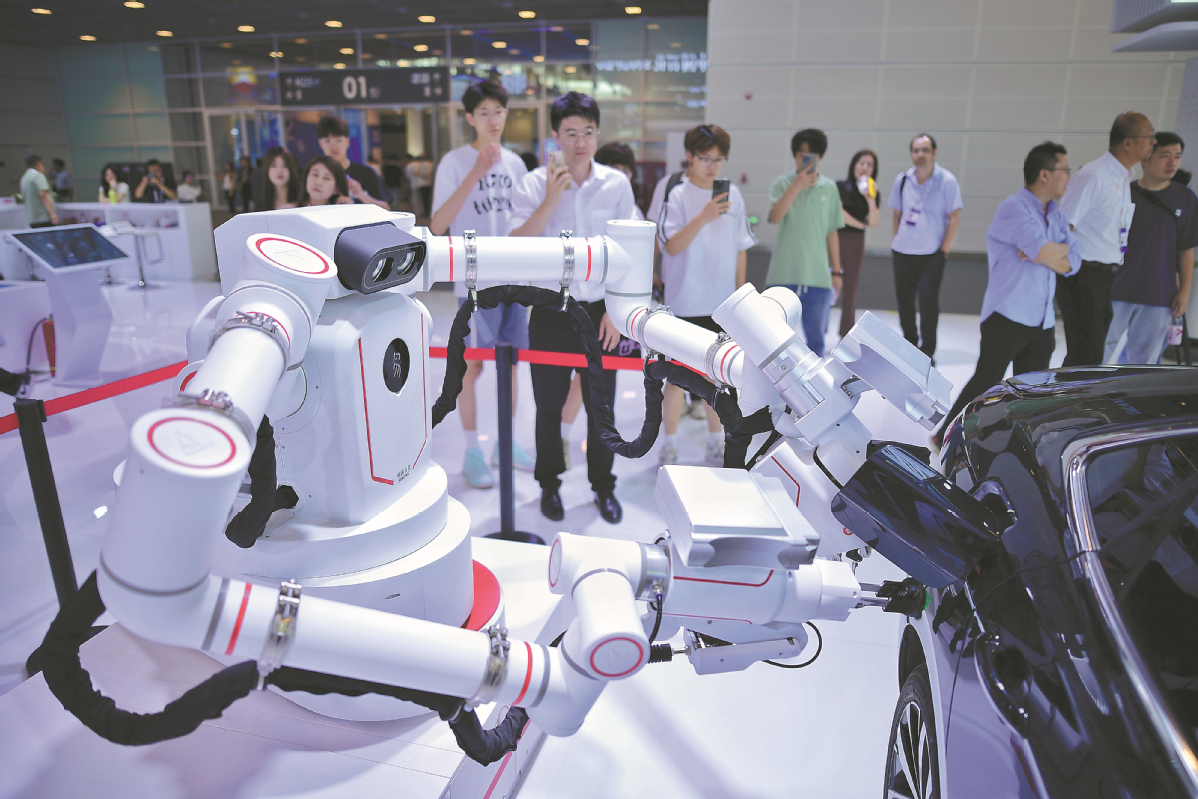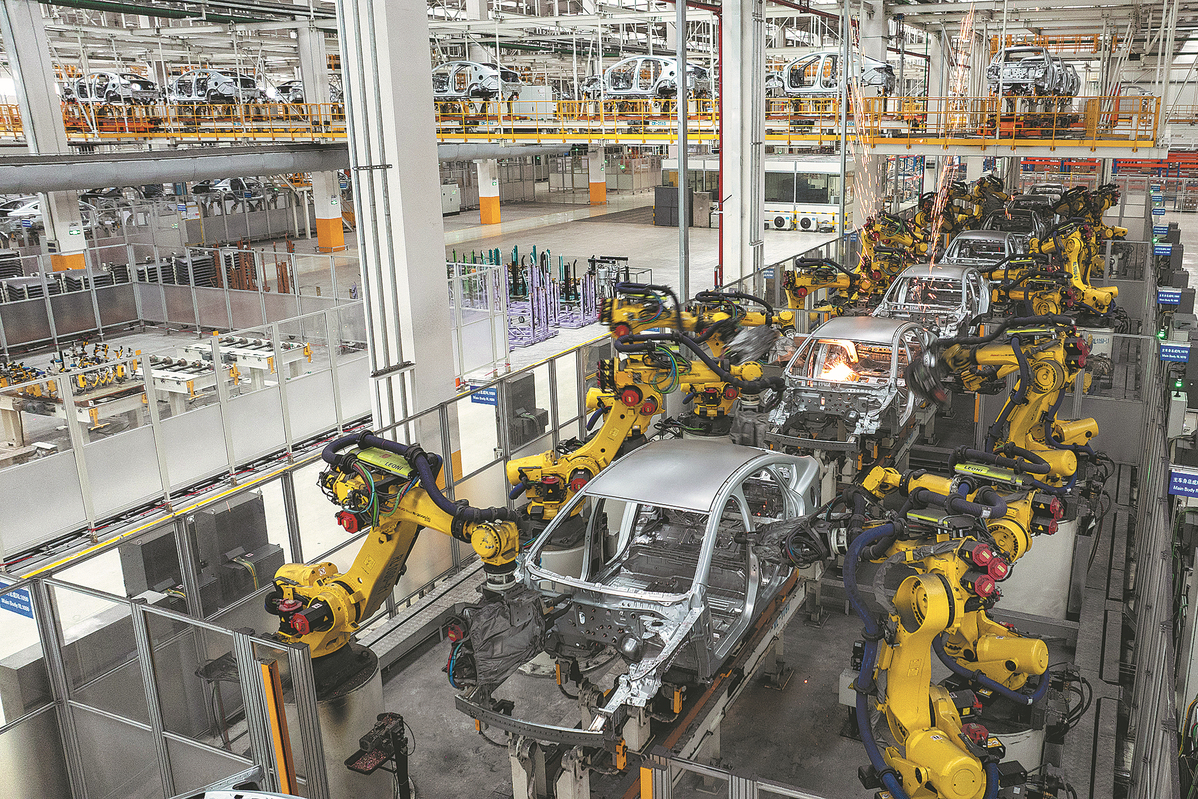Disruptive AI set to transform industry

An AI robot on display attracts visitors during the recent 2024 World Intelligence Expo in Tianjin. (TONG YU/CHINA NEWS SERVICE)
Competition is heating up the fast-developing field of generative artificial intelligence, a cutting-edge disruptive technology that is expected to be increasingly applied to a wider range of sectors and spearhead a new round of industrial transformation and upgrade, domain experts said.
Chinese technology companies, they said, should step up investment in improving computing power and algorithms and accumulate more high-quality training data, so as to gain an edge in the global AI race and narrow the gap with the United States in the latest tech frontier.
Generative AI refers to computer algorithms trained with huge amounts of data capable of generating content such as images, text, audio, and video in a human-like fashion. It is the key technology underpinning US-based research firm OpenAI's ChatGPT.
The recent launch of GPT-4o, the latest large language model or LLM developed by OpenAI, has caused a global sensation. The new flagship generative AI model surpasses the company's existing models in visual and audio understanding, making the interaction between humans and machines much more natural and easier.
LLMs are AI models fed with huge amounts of text data for use in a variety of tasks, ranging from natural language processing to machine translation.
Industry insiders said the multimodal LLMs, which possess the ability to process and generate content across multiple modalities, including text, images, audio, and video, will lead the way for the further development of the generative AI industry, with significant potential for application in various industries like finance, retail, healthcare, and intelligent manufacturing.
According to a report from global consultancy McKinsey &Co, generative AI will add between $2.6 trillion and $4.4 trillion in annual value to the global economy, enhancing all sectors of industry. Banking, high technology, and life sciences are among the industries that could see the biggest impact from generative AI.
Major Chinese tech heavyweights, including Alibaba Group Holding Ltd, Baidu Inc, iFlytek, and Tencent Holdings Ltd, are scrambling to roll out their own AI-powered LLMs and bolster the commercial use of generative AI technology.
In May, Alibaba Cloud, the cloud computing arm of Alibaba Group, unveiled Tongyi Qianwen 2.5, the latest version of its LLM, saying its capabilities have surpassed those of OpenAI's GPT-4 Turbo model, the predecessor of GPT-4o.
The Tongyi Qianwen 2.5 achieved a full upgrade with improved performance in reasoning, code comprehension, and textual understanding compared with the previous version, the company said.
In the context of the Chinese language, the new model has caught up with the GPT-4 model in terms of text understanding and generation, knowledge quiz, dialogues, and life advice, said Zhou Jingren, chief technology officer of Alibaba Cloud.
Alibaba's LLMs have been deployed by over 90,000 enterprise users in industries like consumer electronics, automobiles, education, healthcare, culture, tourism, and gaming.
"We look forward to collaborating with our customers and developers in seizing the immense growth opportunities presented by the latest surge in generative artificial intelligence technology," Zhou said, adding Alibaba Cloud will continue to contribute a diverse array of AI models to the open-source communities.
Official data showed that the Chinese self-developed LLMs rank second in the world, and over 100 LLMs with more than 1 billion parameters each have been launched in China.

Robot arms seen at a production line of BYD in Changsha, Hunan province. (CHEN SIHAN/XINHUA)
Baidu said in April its LLM and ChatGPT-like chatbot Ernie Bot had garnered more than 200 million users since its debut in March 2023, while more than 85,000 enterprise clients had used Baidu's enterprise-level LLM platform Qianfan to create 190,000 AI applications.
Robin Li, co-founder, chairman, and CEO of Baidu, said the multimodal LLMs are key to the future development of AI technology, and this approach has been largely regarded as essential for realizing artificial general intelligence or AGI, which is a theoretical AI system with capabilities that rival those of a human.
He emphasized the biggest difference between China and some Western countries in terms of AI lies in applications, which are driving the rapid development of the AI industry in China.
Li said in the United States and Europe, everyone is trying to come up with cutting-edge foundation models. "In China, although there are hundreds of foundation models, people are increasingly talking about what the super app is for the AI age, or what is the killer app or the AI native app," he noted. "We take more of an application-driven approach.
"More people probably are focused on when GPT-5 will likely emerge, and what kind of new features we will be offering, but I'm more interested in what kind of application can take full advantage of the existing power of large language models."
The Ernie 4.0, Baidu's latest LLM, is better than the GPT-4 in Chinese because the company used a lot more Chinese data to train that model, Li said.
Chinese AI company iFlytek announced in January that its upgraded LLM outperformed GPT-4 Turbo in metrics like language understanding and math. For its part, e-commerce giant JD unveiled its LLM, the ChatRhino, which could be used in various fields, including retail, logistics, finance, and health, as the company aims to bolster digital transformation and upgrade industries by using AI.
Wang Peng, a researcher at the Beijing Academy of Social Sciences, said, "China's major advantages in developing AI lie in abundant data resources and diversified industrial application scenarios, while the US has taken the lead in basic AI research, chips, algorithms and other crucial technologies, as well as a sound innovation ecosystem."
Chinese enterprises should pool more resources to improve the quality of data that satisfies the training of LLMs, optimize algorithms, cultivate talent specialized in the field of AI, and expand cooperation with leading international AI companies, Wang said.
Lu Yanxia, research director at market research company International Data Corp China, said Chinese tech companies' continuous technological advancements in LLMs will further promote the popularization of AI models, and bring fresh business opportunities for domestic AI servers, cloud computing, and chip companies.
She said tech enterprises should pool more resources to improve computing power, algorithms, and quality of data to narrow the gap with the US in the generative AI sector.
The LLMs necessitate higher demand for data and knowledge in professional fields, and for talent that can fine-tune specialized models based on diverse industrial demands, she said.
As various industries adopt the latest wave of digital transformation driven by AI, China's spending on information and communications technology will increase by 9.8 percent year-on-year in 2024, surpassing the global average by two percentage points, IDC said.
Pan Helin, a member of the Ministry of Industry and Information Technology's Expert Committee for Information and Communication Economy, said the training of multimodal AI models necessitates massive requirements for computing capacity resources, which will give a strong boost to the development of the computing power industry.
"Chinese tech companies should beef up independent innovation abilities in underlying computing power chips and programming software, and invest more in basic scientific research, including mathematics, statistics, and computer science, in order to catch up with leading foreign counterparts amid intensifying competition in the global AI industry," Pan said.
According to a report released by global consultancy Accenture, about 85 percent of Chinese business leaders plan to increase investments in generative AI this year, while 73 percent of Chinese company executives are prioritizing investments in strengthening their organizations' digital core capacities, including cloud, AI, platforms, and security.
The report stated that 93 percent of surveyed executives in China agree that the way they interact with data will change, from searching for information to asking questions and receiving direct advice and responses. The research surveyed 2,800 company executives, including 225 from China, between February and March.
Accenture also found as much as 40 percent of all working hours will be supported or augmented by language-based AI, and generative AI has the potential to enable productivity enhancements across 900 different types of jobs.
Joyce Yi, managing director and operations delivery lead of Accenture Greater China, said Chinese enterprises are more willing to spend money on sales and product development in the process of AI applications, while their investments in enterprise operations are relatively less.
Although AI brings about new development opportunities, challenges still remain, experts said and called for efforts to ensure the safe and reliable application of intelligent technology through global governance.
Zeng Yi, a researcher at the Institute of Automation, which is part of the Chinese Academy of Sciences, said the management and governance of risks brought by AI are becoming increasingly important.
The responsible and appropriate use of AI and driving its steady development will allow this technology to be beneficial to all humans, Zeng said.
More efforts are needed to strengthen international cooperation in promoting the sustainable development of AI, and establish a global AI development and governance institution under the framework of the United Nations, he said.
Photos
Related Stories
- China to enhance global AI cooperation
- China home to over 4,500 AI companies: vice minister
- China unveils world’s 1st AI giant panda living in a ‘cloud habitat’
- Intellectual property right protection crucial to healthy AI development
- Hong Kong Investment Corporation announces new strategic partnership in AI
- At China expo, AI takes center stage
Copyright © 2024 People's Daily Online. All Rights Reserved.









